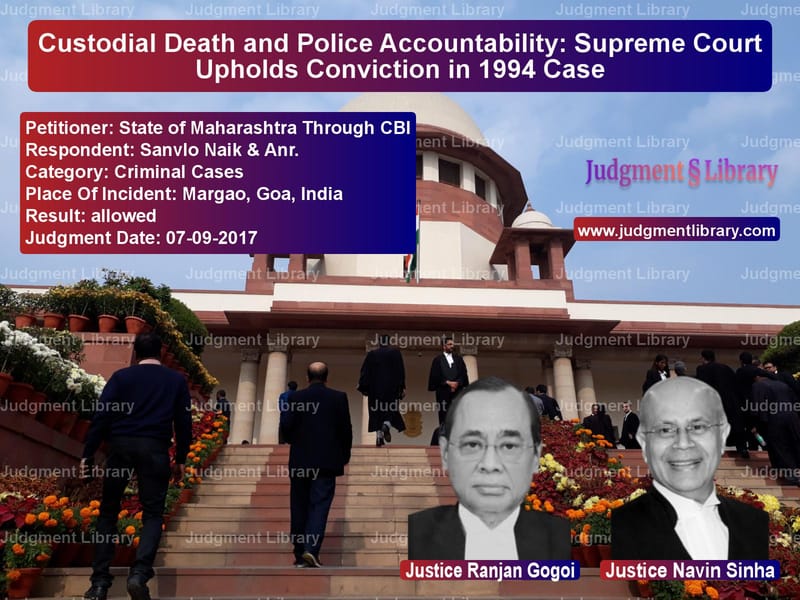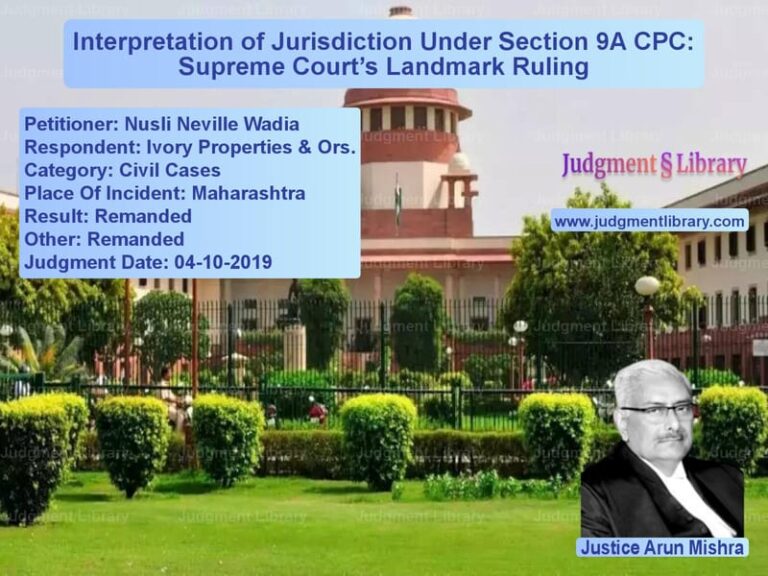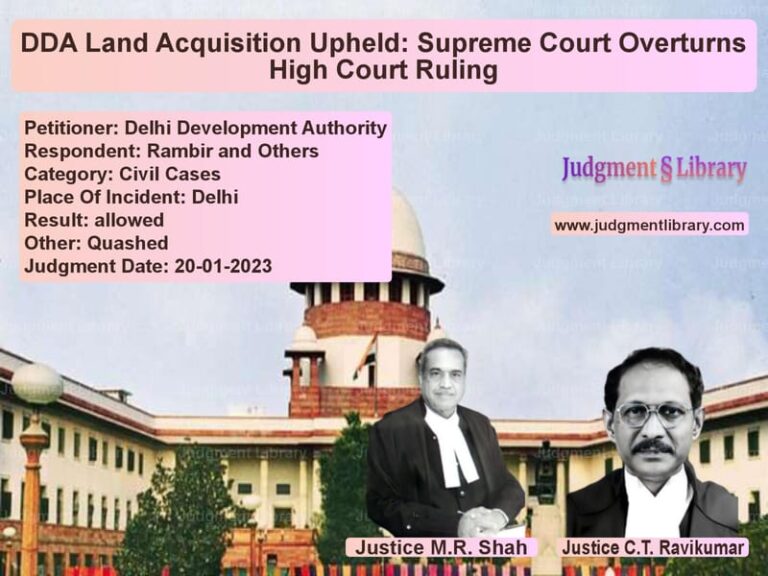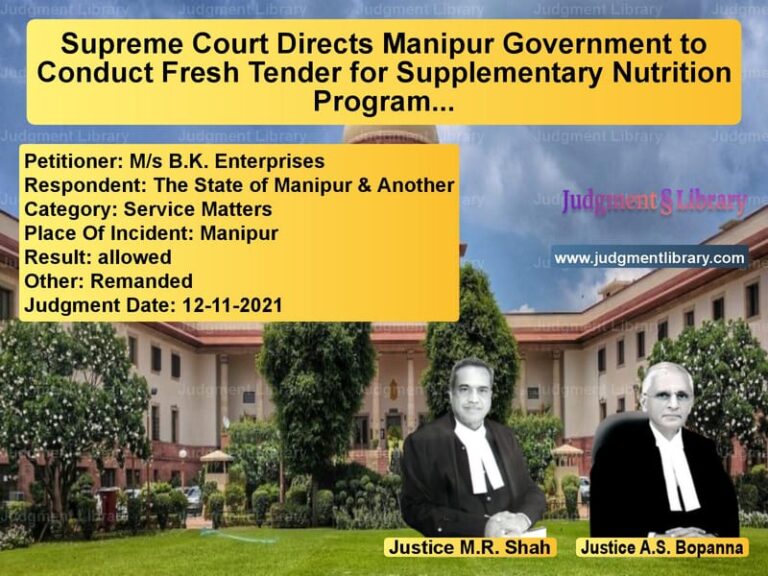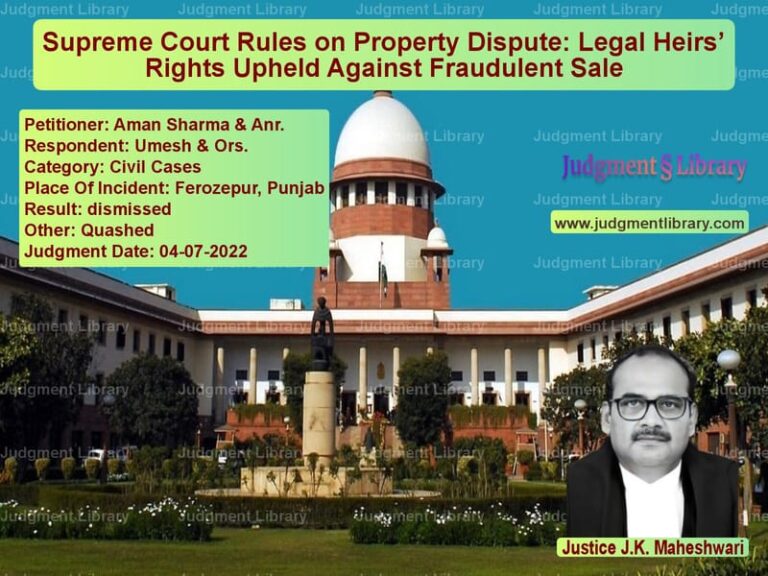Custodial Death and Police Accountability: Supreme Court Upholds Conviction in 1994 Case
The case of State of Maharashtra Through CBI v. Sanvlo Naik & Anr. revolves around the custodial death of an accused in 1994 at the Margao Town Police Station. The Supreme Court, in its judgment dated September 7, 2017, addressed the legal and evidentiary aspects of the case and upheld the conviction of two police officers under Section 304 Part II of the Indian Penal Code (IPC). The judgment underscores the importance of police accountability and the necessity of upholding the rule of law in custodial cases.
Background of the Case
The incident dates back to May 16, 1994, when the Margao Town Police Station arrested the deceased, Abdul Gaffar Khan, in connection with Crime No.141/1994. The accused in this case were two police officers, Inspector-in-Charge S.V. Caeiro and Police Constable Sanvlo Naik. The victim was taken into custody at midnight and reportedly died within a few hours while still in police custody.
The prosecution alleged that Khan was subjected to custodial torture, leading to his death. Initially, seven accused were charged under Section 302 read with Section 34 of the IPC. However, all except Caeiro and Naik were acquitted. The two convicted officers were sentenced to three years and two years of simple imprisonment, respectively, under Section 304 Part II IPC.
Aggrieved by the conviction, the accused officers approached the Bombay High Court, which overturned their conviction and acquitted them. The Central Bureau of Investigation (CBI) then filed an appeal before the Supreme Court.
Key Legal Issues
- Was the acquittal by the Bombay High Court justified in light of the evidence?
- Could the Supreme Court enhance the punishment under Article 136 of the Constitution?
- Was the custodial death a result of intentional torture or negligence?
Arguments by the Appellant (CBI)
The Solicitor General of India, representing the CBI, presented the following arguments:
- The victim was brought to the police station in good health, as confirmed by multiple witnesses, and he suffered fatal injuries while in custody.
- The police station diary showed inconsistencies and missing pages, indicating a cover-up.
- The post-mortem report found 14 injuries on the deceased’s body, which were ante-mortem and caused by blunt force.
- The accused officers’ claim of alibi was false and contradicted by witnesses and documentary evidence.
- The Supreme Court has the power under Article 136 to correct the High Court’s erroneous judgment and reinstate the conviction.
Arguments by the Respondents (Accused Officers)
The defense, representing the accused officers, argued:
- The injuries on the deceased were superficial and could not have caused death.
- There was no direct evidence linking the accused to the custodial violence.
- The police diary entry indicated that the accused left the police station before the victim’s death.
- The trial court and High Court had differing views, and the Supreme Court should not interfere with the acquittal.
Supreme Court’s Analysis
On the Alibi of the Accused
The Supreme Court rejected the plea of alibi, noting that the police station diary had been manipulated and contained overwriting and missing pages. The Court stated:
“The General Diary register of the police station contains overwriting, missing pages, and suspicious entries. Such discrepancies indicate an attempt to fabricate records to support the accused’s alibi.”
On Custodial Death and Police Accountability
The Court reiterated the principle that in custodial deaths, the burden of proof shifts to the police officers in charge. It cited the landmark judgment DK Basu v. State of West Bengal (1997), which laid down guidelines for the protection of detainees. The Court held:
“When a person dies in police custody, and there is no plausible explanation by the custodians, the presumption of culpability shifts upon them.”
On the Nature of Injuries
The post-mortem report, conducted by a panel of doctors, found that the deceased suffered 14 injuries, which were fresh and could not be self-inflicted. The Court noted:
“The medical evidence clearly establishes that the injuries were ante-mortem and caused by blunt force, which is inconsistent with the respondents’ defense.”
Final Judgment
The Supreme Court overturned the Bombay High Court’s acquittal and restored the conviction under Section 304 Part II read with Section 34 IPC. The Court also enhanced the sentence:
“Considering the gravity of the offense and the fact that the deceased died in custody, we impose the maximum sentence under Section 304 Part II, awarding 10 years of rigorous imprisonment.”
The Court directed the accused officers to surrender immediately and serve the sentence.
Conclusion and Legal Impact
The Supreme Court’s judgment in this case reinforces the principle that custodial deaths cannot go unpunished and that law enforcement officers must be held accountable for any abuse of power. The ruling ensures that police officers adhere to legal procedures and that justice is served even when state actors are involved.
The judgment sets an important precedent for custodial death cases, affirming that:
- Police accountability is essential in a democratic system.
- Alibi defenses must be scrutinized in cases involving custodial violence.
- Medical evidence plays a crucial role in determining custodial torture.
By enhancing the sentence to 10 years of rigorous imprisonment, the Supreme Court has sent a strong message that custodial deaths will not be tolerated and that officers who abuse their power will face severe consequences.
Don’t miss out on the full details! Download the complete judgment in PDF format below and gain valuable insights instantly!
Download Judgment: State of Maharashtra vs Sanvlo Naik & Anr. Supreme Court of India Judgment Dated 07-09-2017.pdf
Direct Downlaod Judgment: Direct downlaod this Judgment
See all petitions in Custodial Deaths and Police Misconduct
See all petitions in Attempt to Murder Cases
See all petitions in Fraud and Forgery
See all petitions in Judgment by Ranjan Gogoi
See all petitions in Judgment by Navin Sinha
See all petitions in allowed
See all petitions in supreme court of India judgments September 2017
See all petitions in 2017 judgments
See all posts in Criminal Cases Category
See all allowed petitions in Criminal Cases Category
See all Dismissed petitions in Criminal Cases Category
See all partially allowed petitions in Criminal Cases Category

